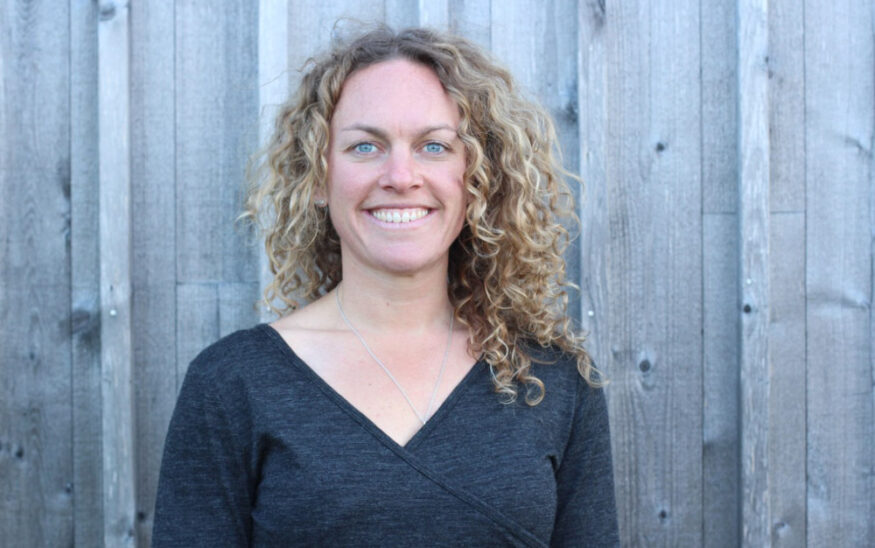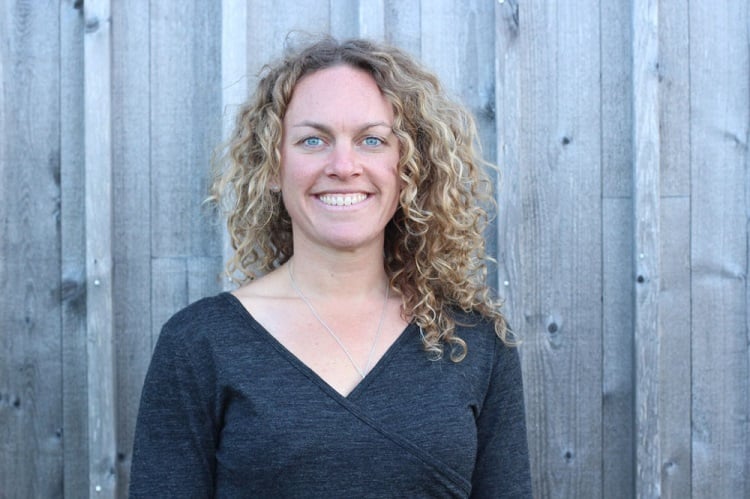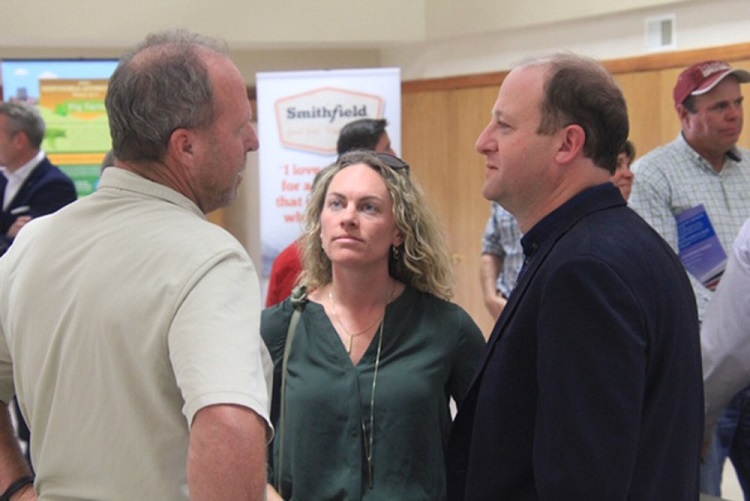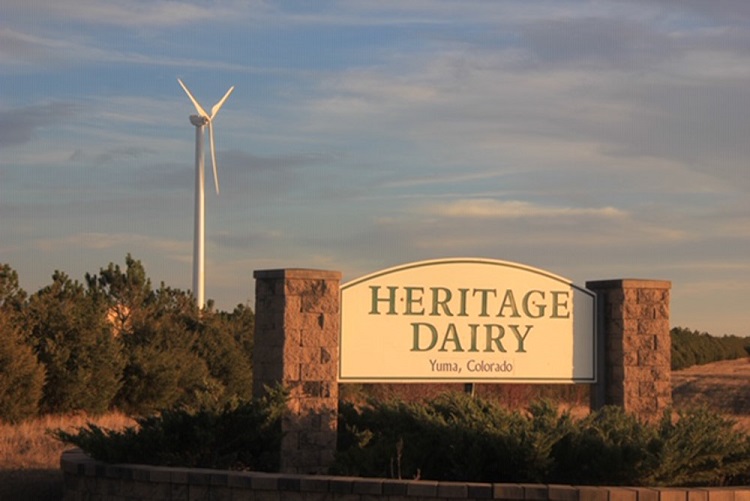Kate Greenberg ushers in a new age of Colorado agriculture
Greenberg is bridging divides and breaking stereotypes as the state's ag commissioner
Allen Best //February 11, 2020//


Kate Greenberg ushers in a new age of Colorado agriculture
Greenberg is bridging divides and breaking stereotypes as the state's ag commissioner
Allen Best //February 11, 2020//

Colorado Gov. Jared Polis in August was touring the state’s agriculture laboratories in Broomfield when he made the off-hand suggestion that researchers look into plant-based meats. Livestock producers immediately had a beef with the governor. Livestock account for 70% cash receipts in Colorado’s $7 billion agriculture economy, and cattle alone are 50%.
Agriculture Commissioner Kate Greenberg was tasked with handling some of the fallout. But then, some saw her as suspect, too.
Greenberg is the first-ever female commissioner for Colorado, and at 32, probably the youngest. She differs in every obvious way from her recent predecessors, who were men of a certain age named Don (Ament and Brown) and John (Salazar and Stulp), all Colorado natives who were farmers or ranchers themselves.
But deep in her bones, Greenberg has crops and animals, soil and water, and farms both big and small. Months after the aforementioned meat brouhaha, she describes it as a distraction to the big issues in Colorado agriculture.
“We have low product prices, we have rising farm debt, we have increasing suicide rates, and we have population growth putting incredible pressure on land prices and water,” she says. “These are perennial problems that are affecting farmers’ and ranchers’ economic health and the mental health of rural Colorado. When you add in a market trend (the demand for meatless products), it can seem like something that is pummeling ag.”
From her spacious office at the Department of Agriculture’s headquarters in Broomfield’s Interlochen business park, Greenberg oversees 300 employees, half of whom work at Broomfield, and the other half scattered around the state: Palisade, Monte Vista and Pueblo. She’s in downtown Denver two days a week but also frequently on the road. Twenty times in her first 10 months, she ventured out to listen and learn from Sterling to Cortez, Steamboat Springs to Lamar.
Don Ament, the ag commissioner from 1999 to 2007 and a farmer from Iliff, located 140 miles northeast of Denver, worries that brisk Front Range growth has left Colorado with a sharper, higher divide between urban and rural. Colorado’s cities are now populated by people who no longer have grandpa and grandma on the farm, as was common even a generation or two ago. That link, that education, is being lost, he says.
Greenberg sees herself as a bridge between urban and rural. But she’s also a bridge between conservative and liberal, between conventional agriculture and its future, between the state’s slopes, east and west.

Before becoming ag commissioner, Greenberg worked for the conservation group the Sonoran Institute, and she lived for seven years in Durango, which she still considers home. There, she worked for the National Young Farmers Coalition as Western program director, traveling across the Western Slope and other states to recruit young people into agriculture. “Just do it,” she advised young people looking to move into roles of leadership in food and agriculture. “Don’t wait until you feel ready (because you probably never really will).”
After Polis was elected in November 2018, she encouraged some of those young farmers and ranchers to apply to be the ag commissioner. When none did, she applied herself.
Among her references was Patrick O’Toole, who owns a 20,000-acre cattle and sheep ranch that straddles the Wyoming-Colorado border northwest of Steamboat Springs. O’Toole, a Republican and former state legislator in Wyoming, had been impressed by Greenberg’s ability to draw together diverse agrarians.
Reared in Minnesota, Greenberg credits her parents with encouraging her to take risks. Her passion for agriculture, however, did not emerge until she traveled west to attend Whitman College in Walla Walla, Washington. There, in a setting much like Colorado’s Grand Valley, she studied but also began working on farms. After graduation, she held a position where she worked from dawn to dusk and in every aspect of agriculture production: growing vegetables, raising animals, getting dirt under her fingernails and putting pencil to the business of food.
She had decided that eating without the labor of producing the food was an “immense privilege.” She resolved to be “part of the work, not just growing the food, but keeping the people in business who grew the food.” That means public policy. “You can’t avoid that if you want to be in ag,” she says.
Former Iowa Gov. Tom Vilsack, the agriculture secretary under President Barack Obama, considers Colorado a “diverse and somewhat complex” agricultural state. “It has an astonishing natural-food ethic and culture, which plays to the strengths of more niche products,” he says.

Colorado has enormous diversity in the size of its farms and ranches, too. There’s Louis Bacon’s 180,000-acre Trinchera spread along the Sangre de Cristo Range, and John Malone’s ranches in North Park and elsewhere that together cover 150,000 acres. But half the state’s 39,000 farms and ranches are smaller than 200 acres, says Bill Meyer, who directs the federal agency that tracks agriculture statistics in the mountain region.
Regardless of size, ag advocates warn that Colorado’s farms and their financial health could be forever impacted by President Donald Trump’s tariff battles with China. Prices continue to sag, and capital costs remain.
“I do not believe the exports of grains will return to the same level that they were pre-trade tariffs,” Don Marvin, chairman of Concentric Ag Corporation, a technology, innovation and new-applications firm, told a recent farm symposium. “The Chinese government, he added, “will not be held hostage to the United States and North America.”
Still, Greenberg manages a public smile. “I’m excited to be an advocate of agriculture,” she says, describing her job and that of her department as both promoting agriculture and protecting the environment. It’s work that “gets done in partnerships, in relationships,” she says.
Paramount among Greenberg’s goals is keeping people on the land. “And we want to help new people get access to land and capital,” she says. “We want more people in ag rather than fewer.”
Scaling high-value agriculture, including both hemp and organics, is another goal. Growing of hemp, the low-THC relative of marijuana, unofficially began in Colorado in 2014 with one acre. In 2019, the state recorded 52,300 planted acres. Lots of people have made money from hemp through sale of derivative oils, and it has drawn new people into agriculture, Greenberg says. But the industry’s sustainability will depend on building supply chains and new markets for hemp products. The state government’s role is still being figured out in a program called CHAMP, or Colorado Hemp Advancement & Management Plan, a collaboration of 175 stakeholders, including 10 state agencies.
Organics also represent high-value revenue. Organic sales in Colorado grew from $68 million to $135 million in the five-year span ending in 2017. That’s still less than 2% of total agricultural cash receipts.
What Greenberg describes as “responsible stewardship” constitutes the Polis administration’s final major initiative for agriculture. “We are looking to scale up our work on soil, water and climate,” she says.
Does she foresee creation of an ecosystem services market for agriculture within a few years? “Maybe that’s something in the future,” she says, noting that California has developed a carbon market to finance its conservation and stewardship activities. “But regardless of when it happens, I want rural Colorado to benefit, I want farmers and ranchers to benefit. I don’t know yet what role the state can and should play in developing such a market.”
Count Chris Treese among Greenberg’s fans. Representing the Colorado River Water Conservation District at Club 20, the Western Slope advocacy organization, he saw her in action. “There is no ‘I can’t do that’ in her vocabulary. I have great respect for her and am absolutely convinced she will be successful. But first she has to win over the ag community,” Treese says. “My understanding is that she is doing it the only way you can, which is one farmer, one cup of coffee, one meeting at a time.” He characterizes Greenberg’s message at Club 20 meetings as “you didn’t choose me, but I choose you, and I’m here as an advocate.”
But amid the corn fields and feedlots of northeastern Colorado, talk of sustainability and restoring soil fertility grates on the ears of those whose families have worked the land for a century. “The implication is that we haven’t taken good care of the factory, that we don’t take good care of the soil. That’s what I resent most,” says one third-generation farmer. The farmer also noted a cultural tension. His neighbors find it hard to relate to someone who spends her vacations kayaking.
In October, Polis atoned for his meat flap with a trip to Yuma, where he visited one of the state’s big corporate farms. Smithfield produces hogs there and has two wind turbines, part of plans to become self-reliant on renewable energy. That happens to align with Polis’ goal, now codified into legislation, to decarbonize Colorado’s economy 90% by 2040.
Afterward, at the Yuma Community Center, Polis and Greenberg chatted it up at a small gathering. Those in attendance were friendly enough, if a bit reserved.
“We have a stereotype of who and what an ag commissioner is, and Kate is breaking that mold, which is hard,” says Reagan Waskom, director of the Colorado Water Center at Colorado State University.
Moving into her corner office, Greenberg had consulted with several predecessors and many others. “I respect the foundation that I have inherited and stand on,” she says. “I am also interested in doing this job in my way. That doesn’t mean my way only. My way is actually quite collaborative. I want a lot of opinions. I want people to push back.”


























